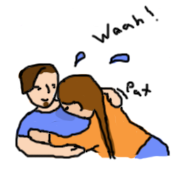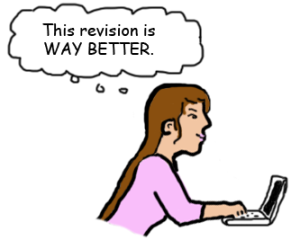When I was a wee child, picking a topic to write about was easy: I wrote COOL SHIT. Like… bicycles that transform into helicopters or space ships or motorcycles or maybe power armor and I should have a cool robot friend who is sarcastic and transforms into like a briefcase.
(I watched a lot of Transformers, back then.)
Writing that stuff was FUN. It was awesome. But then I started showing my work to people and getting critiques back and, well, turns out I couldn’t end EVERY chapter with people literally hanging off cliffs and resolve it with an unexpected new gadget on my transforming motorbike robot friend. Who knew?
So I moved from just writing whatever came to mind to asking myself: What CAN I write?
I got hella autobiographical, because in High School I’d heard a lot about “writing what you know.” (And can anyone tell me where the heck THAT advice comes from? Because I’ve never heard it come from a writer-person, just people who in fact do not write quoting what they believe to have been some unnamed authority in the past. To me it sounds like a classic cop-out to avoid giving actual writing advice. Or maybe a vast conspiracy to stop writers from asking their friends questions like “Hey, cop-friend, what is arresting someone like?” or “Hey, mechanic-friend, what tools do you have in your garage?”)

I digress. This entire stage was a reaction. I’d been told what I couldn’t write, so I had to find what I could. I tried to copy what I’d seen in other stories. I sought out writing prompts and churned through different sub-genres and tropes looking for ones that didn’t generate negative feedback. That’s the key here – the big motivation was to get my writer’s workshop to all say “yeah this one worked.”
After a decade of hard work and monthly writer’s workshop, I got to the point where even cranky Dr. Geoff Landis started off most of his critiques with, “Generally, I liked it.”
I started trying to sell my stories.

That… didn’t go well, for another decade. I’d studied and honed my craft to the point where I could write a competent story, but that wasn’t enough. I worked on killer last lines, exciting opening sentences, and plausible science. Nothing was enough.
The next question was, “What can I write that will sell?”
Charts. Statistics. Wordcounts. Article after article on escaping the slush pile. I slowly got a sense of what editors were looking for: Not something that was merely competent, but something that moved them. I cranked out stories that I hoped would make people laugh or cry. I had to abandon some of my hard-won structural perfection and get a little messy again. I had to be experimental. I wrote some truly awful stories, but the ones that were good, were good AND interesting.

And yeah, okay, at this point I started selling stuff. I found I could sell a variety of different stories with different tones, settings, ideas.
You can tell from all these blog posts I’m writing that I’m also learning a lot about how much I didn’t understand before.
So now I’m asking myself: If I can write anything at all, so long as it elicits emotion and tells a complete story, well, then, What do I WANT to write?
It feels good to be back at the beginning.



